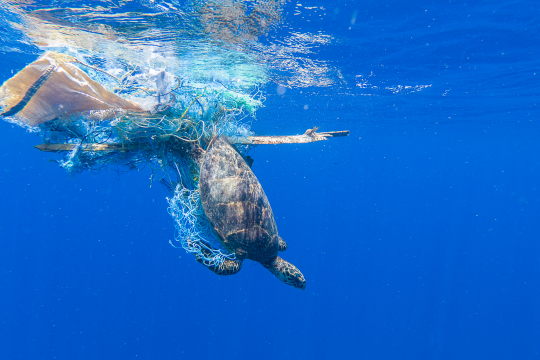A new study by an EfD researcher and co-authors reveals the extent and impacts of abandoned, lost, and discarded fishing gear (ALDFG) on marine ecosystem services and human wellbeing. The authors also suggest a number of urgent measures that are needed to address the problem.
Derelict fishing gear, also known as ALDFG, is a growing problem that challenges marine conservation and management. Many types of fishing gear continue to catch fish and other animals after they are lost or discarded, causing ghost fishing. This phenomenon reduces the abundance and diversity of marine life, damages ocean floor ecosystems , and affects animal welfare and non-use values.
Plastic pollution cause wide variety of problems
ALDFG is also a significant source of marine plastic pollution, as most fishing gear is made of synthetic materials that do not degrade quickly. Plastic pollution can harm aquatic organisms through ingestion, entanglement, or transport of invasive species. It can also affect the quality and functioning of marine ecosystems, such as climate regulation and waste mediation.
Policy implications have been ignored
The study, published in the journal Marine Policy, reviews and analyzes the existing literature on ALDFG and ghost fishing and conducts a meta-analysis of experimental studies to identify the factors that affect the catch rate of ghost gear. The study finds that ALDFG negatively impacts the provisioning, supporting, and cultural ecosystem services, but the impacts on regulating services are largely ignored in the literature. The study also finds that the catch rate of ghost gear depends on exposure time, water depth, gear type, and species.
Wider perspective is needed
The study concludes that ALDFG is a global problem that requires more research and management, especially in regulating services, non-market costs, and developing countries. The study suggests that a wider geographic scope, a broader perspective on ecosystem services, and a more holistic assessment of economic losses are needed to provide more knowledge-based input for shaping management.
One of the study's authors is Huu-Luat Do, a research fellow from the Environment for Development (EfD) Vietnam and Blue Resources for Development (BlueRforD) program. He says this study contributes to the EfD's mission of promoting sustainable development and poverty reduction through evidence-based policymaking.
"We hope that our study can raise awareness about the severity and complexity of the ALDFG problem and provide insights for policymakers, fishers, and consumers to take actions to prevent gear loss, retrieve lost gear, and promote biodegradable fishing gear,” Huu-Luat Do says.
By: Nhan Le
